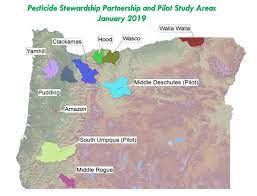Over the past two years, the LWV of Portland OR in cooperation with the state LWV has been working on a new study. This means that once local leagues reach consensus to support this study, it becomes an official platform that the League can use to advocate for various policy positions and actions. This is how the League works: we study an issue, reach consensus and then use that information to support or oppose various public policies and actions. We remain non-partisan; this is an issue, not a party or candidate. LWV Klamath County plans to support this study.
Summary of new study:
The use of pesticides is a balancing act between advantages and disadvantages. Understanding the impacts, both beneficial and adverse, requires a broad overview of prevailing policy and the effects that policy has had. This study reviews the environmental and health costs and benefits of pesticide use, the current state of regulation at the federal, state, and local level, and the practices and precautions presently in place for their use. It reviews potential improvements to regulations and changes to practices that could improve outcomes and protect the environment and human health while maintaining a stable, safe, and reliable supply of foods and other farmed products.
Five key areas of pesticide development, use, and policy were identified for review and potential improvements:
- Education, training, and labeling
- Transparency and information gathering
- Funding, research, and evaluation
- Adaptive management and Integrated Pest Management
- Burden of proof and the precautionary principle.
Impacts of and Issues Surrounding Pesticide Use
Because pesticides are essentially chemical poisons or biological agents that make compounds toxic to certain species, their use must be considered in the light of their overall effects…. While pesticides are brought to market after extensive research and testing, we constantly learn new information about environmental ecosystems and human and animal physiology that may cause us to reexamine how, when or if they should be used. As human populations have increased, the need to develop a safe and stable supply of food and non-food crops has also grown. Control of disease carrying insects and animal carriers is increasingly necessary, especially as the global climate changes. These benefits must be balanced with the potential harm their use may cause.
Read the entire study HERE.
You may also view a panel discussion held on this topic HERE.
Further Reading:
https://www.opb.org/article/2020/12/15/oregon-pesticides-chlorpyrifos-christimas-trees-chemicals/
https://www.oregon.gov/oda/programs/pesticides/pages/aboutpesticides.aspx
https://oregonforests.org/herbicides
